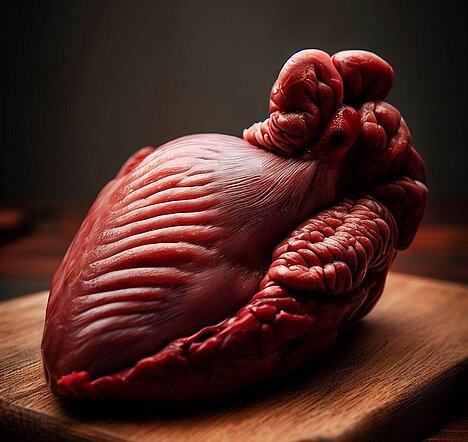Turkey heart

What is turkey heart?
Turkey heart is the heart of the turkey, a large poultry farmed mainly in North America, Europe and Asia. The heart is a strong muscle that is about three times the size of the chicken heart. It has a dark red color and a firm consistency.
What are the benefits of turkey heart for dogs?
Turkey heart has many benefits for dogs, which you can read about here:
- Protein: turkey heart is an excellent source of protein for dogs. Protein is essential for building and maintaining muscles, skin, hair, nails and organs. Protein also supports the immune system and wound healing.
- Fat: Turkey heart contains healthy fat that provides energy and promotes the absorption of fat-soluble vitamins. Fat also protects the organs, insulates the body and provides a shiny coat.
- Taurine: Turkey heart is rich in taurine, an amino acid that is important for dogs. Taurine supports the function of the heart, eyes, nerves and muscles. Taurine can also protect against heart disease and improve fertility.
- Purine: Turkey heart has a high purine content, which promotes the formation of uric acid in the body. Uric acid is an antioxidant that fights free radicals and inhibits inflammation.
What are the disadvantages of turkey heart for dogs?
Turkey heart also has some disadvantages for dogs, which you can read about here:
- Purine: purine can also cause too much uric acid in the body, which can lead to gout or kidney stones. This particularly affects dogs that are prone to these conditions or have impaired kidney function. These dogs should eat little or no turkey heart.
- Allergy: Turkey heart can trigger an allergy in some dogs, which can manifest itself as itching, skin rash, diarrhea or vomiting. This mainly affects dogs that are generally sensitive to poultry or have a food allergy. These dogs should not eat turkey heart.
- Quality: Turkey heart should only be of high quality to ensure good digestibility. This means that it should be fresh or frozen and come from species-appropriate husbandry. Turkey heart from factory farming or treated with antibiotics or hormones should be avoided.
How do you feed turkey heart to dogs?
Turkey heart can be fed to dogs raw or cooked. Raw turkey heart is particularly suitable for barfers who want to feed their dog fresh meat. Cooked turkey heart is a good alternative for dogs that cannot tolerate or do not like raw meat.
Turkey heart can be used as a main meal or as an addition to food. However, it should not be fed too often, as this can lead to an oversupply of purine or an imbalance in the diet. The rule of thumb is to feed turkey heart once or twice a week, but not more than 10 percent of the total amount of food.
Turkey heart can be fed whole or minced, depending on the size and preference of the dog. In one piece, it has the advantage that it cleans the teeth and encourages chewing. Chopped up, it has the advantage that it is easier to portion and digest.
Turkey heart can be combined with other ingredients to create a varied and tasty meal. For example, turkey heart can be mixed with millet flakes, carrots, Jerusalem artichokes, zucchinis, lamb's lettuce, caraway seeds, turmeric, coconut oil, thyme and cottage cheese. Or you can mix turkey heart with potatoes, broccoli, apple, parsley, linseed oil, eggshell and quark.
Turkey heart is therefore a healthy ingredient for dogs that has many benefits. However, it should only be fed in moderation and in good quality to avoid possible disadvantages. With a little creativity, you can turn turkey heart into a tasty and nutritious food for your dog.
If you notice any signs of hypersensitivity or poisoning in your dog, you should see your vet immediately. We are not a substitute for a vet, but we try to be as accurate as possible. Every dog reacts differently and we recommend you get a second opinion or consult your vet if in doubt.
Stay healthy and take good care of your four-legged friend!😊